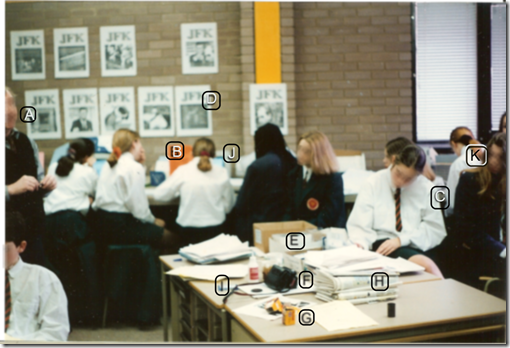So, you're responsible for the use of educational technology in the school, but its use and principles are taught across the curriculum rather than as a discrete subject. In other words, by non-specialists in all likelihood. How can you maintain high standards in the subject and the use of educational technology in such a situation? In this article I look at 14 suggestions.
Read MoreHow to convince colleagues to use education technology in their lessons
If you’re the education technology lead in your school, and your job involves encouraging other teachers to use education technology, what’s the best approach?
Read MorePlanning, by Terry Freedman
Implementing a whole-school IT policy
Here is the very first article of mine that was published in an education magazine. Not all of it is relevant today, but perhaps surprisingly much of it is.
Read MoreHarmonicas by Terry Freedman
7 Ways of Making the ICT and Computing facilities More attractive to use
How can you encourage other teachers to use the ed tech facilities? You may not know this, but there is not a lot of difference between a Lee Oskar diatonic harmonica (the type used by blues and folk musicians) and a Hohner Blues Band harmonica. The Lee Oskar is said to have been engineered to give a “sharper” edge to the tone, which suits the blues sound, whereas the Marine Band, being slightly “softer”, works well for folk music too. Unless you’re a purist, there is probably not much in it. As someone once said:
Read More“A difference is only a difference if it makes a difference.”
Maintaining Standards
 So, you're responsible for the use of educational technology in the school, but its use and principles are taught across the curriculum rather than as a discrete subject. In other words, by non-specialists in all likelihood. How can you maintain high standards in ICT and the use of educational technology in such a situation?
So, you're responsible for the use of educational technology in the school, but its use and principles are taught across the curriculum rather than as a discrete subject. In other words, by non-specialists in all likelihood. How can you maintain high standards in ICT and the use of educational technology in such a situation?
In this article I look at 14 suggestions.
7 Ways of Making ICT More attractive
 You may not know this, but there is not a lot of difference between a Lee Oskar diatonic harmonica (the type used by blues and folk musicians) and a Hohner Blues Band harmonica. The Lee Oskar is said to have been engineered to give a “sharper” edge to the tone, which suits the blues sound, whereas the Marine Band, being slightly “softer”, works well for folk music too. Unless you’re a purist, there is probably not much in it. As someone once said:
You may not know this, but there is not a lot of difference between a Lee Oskar diatonic harmonica (the type used by blues and folk musicians) and a Hohner Blues Band harmonica. The Lee Oskar is said to have been engineered to give a “sharper” edge to the tone, which suits the blues sound, whereas the Marine Band, being slightly “softer”, works well for folk music too. Unless you’re a purist, there is probably not much in it. As someone once said:
“A difference is only a difference if it makes a difference.”
Found on the web: 11/22/2011 (p.m.)
-
Interesting approach to encouraging teachers to use technology in their teaching, specifically Web 2.0. It is similar to what some teachers told me about how they encourage their colleagues to use interactive whiteboards more effectively, whilst I was doing research for an article recently.
13 reasons to use educational technology in lessons
Technology and society
 For an interesting discussion with your students on the effects of technology on society, consider the impending solar flares.
For an interesting discussion with your students on the effects of technology on society, consider the impending solar flares.
As the article states:
The so-called "X-flare" could also cause radio signals to jam, satnavs to fail and electrical power grids to falter. Electromagnetic storms are already reported to have stopped shortwave radio communications in southern China.
Using technology in the curriculum
The big challenge facing ICT leaders in schools is often not to do with providing the facilities, but in encouraging teachers to use those facilities – and to do so in a meaningful way. We’ve all seen examples of where students are allowed to play on the computer if they’ve finished their “real” work, or where students whose regular teacher is not in school, and for whom no work has been set, get to do the same.
Getting Teachers Engaged With Technology
Related Articles?
What Skills Does an ICT Co-ordinator Need?
 First, a quick translation. What we Brits call an ICT Co-ordinator, our American cousins tend to refer to as a Technology Co-ordinator. It’s all very confusing, and would never have arisen had the USA not broken away from us a couple of hundred years ago. But I digress.
First, a quick translation. What we Brits call an ICT Co-ordinator, our American cousins tend to refer to as a Technology Co-ordinator. It’s all very confusing, and would never have arisen had the USA not broken away from us a couple of hundred years ago. But I digress.
7 More Rules for ICT Teachers, Co-ordinators and Leaders
 All over the country, indeed all over the world, ed tech evangelists are bending over backwards helping, training and cajoling their colleagues into adopting the use of technology in their own curriculum area. Let’s be honest, most of the time it’s a thankless task. The hapless ICT Co-ordinator
All over the country, indeed all over the world, ed tech evangelists are bending over backwards helping, training and cajoling their colleagues into adopting the use of technology in their own curriculum area. Let’s be honest, most of the time it’s a thankless task. The hapless ICT Co-ordinator
In The Picture: History Lesson
Here’s a photo that was taken circa 1990. It shows a history lesson in progress, in one of the computer rooms. This is the sort of lesson I really like. As you can tell from looking at the picture, which was unposed, all the kids are fully engaged. The history teacher can be seen to the left of the photo, almost out of shot – literally a guide on the side. The topic, as you may have gathered, is the assassination of President John F. Kennedy, and the students, who were 14 at the time, were using a variety of sources, both digital and paper.
I’ve annotated the photo with letters. Here’s what they indicate.
A: The history teacher.
B Two girls collaborating on researching a database.
C Girl making notes on her findings, on paper, for use in a presentation later.
D Screenshots from the JFK database showing photos that were taken at the time.
E You can’t see it very well, but that’s a box of printer paper for use in a dot matrix printer. The paper was a ream of pages joined up and perforated, like toilet paper, with sprocket holes down the sides.
F A camera. I used to use cameras in my lessons to capture what went on. Note that this was pre-digital camera days, so the camera took…
G … Film.
H Newspapers, just one of several types of resources we used in the lesson.
I It’s not very clear, but that’s a 3.5” so-called “floppy disk”. That one could hold around 740 kilobytes of data.
J A monitor. It looks very quaint now, but I’d equipped the room with Atari ST computers. Although mainly associated with games, there was a range of office and educational applications available. All the programs shared common menus, which made it very easy to learn new applications – remember, this was around the time of Windows version 1. The monitors were high definition, with black text on a white background, unlike certain other computers at the time. They were fast too.
K As far as I can tell, this is one of only two girls in the entire class who was actually listening to the teacher at the time; well, be fair: they had work to do!
If you think I’ve missed some bits which need explaining, please let me know.And please let me know if you find this sort of thing interesting.
The Art of Stating the Obvious
Do advertisers know something we don’t? Some years ago a soft drinks company brandished the slogan “Our bottles are sterilised with steam!” – omitting the fact that all soft drinks companies used that method. I was reminded of this yesterday whilst in a hardware store (the old kind of hardware, ie nuts and bolts and things). On sale was a fly swat whose packaging proudly declared: “Poison-free”. That’s right: there wasn’t even an exclamation mark, which would at least have hinted at self-irony.
 Tell me something I DON'T knowHave ICT Co-ordinators and others whose job it is to bring other colleagues on board with using technology missed a trick? Perhaps posters could inform people that computers do things automatically, or that word processors have built-in spell-checkers.
Tell me something I DON'T knowHave ICT Co-ordinators and others whose job it is to bring other colleagues on board with using technology missed a trick? Perhaps posters could inform people that computers do things automatically, or that word processors have built-in spell-checkers.
Actually, I know I’m being slightly cynical, but on a serious point, where do you draw the line? For example, I am pretty sure that a lot of people don’t realise that spreadsheets let you run the same basic calculation over and over again without your having to enter all the information again – unlike with a calculator, once you have set the spreadsheet up all you have to do is change the numbers (variables) you use.
I’m fairly confident that most people know that spell-checkers are a feature of word-processors, but what about the outlining feature, which allows you to see only the main headings? And if aware of that, are they further aware that by changing the order of those headings, they will automatically move all the text under them?
People don’t know what they don’t know. It may be worthwhile trying to think of things your colleagues don’t know about the computer facilities in your school – and then telling them all about what, to you, is obvious.
If Your ICT Provision Were a Restaurant...
 Presentation is important tooA lot of restaurants provide free 'extras' that help to make the experience enjoyable. So, as an interesting little exercise, if you're an ICT co-ordinator or ICT subject leader, what do you do to make people's experience of ICT more pleasant?
Presentation is important tooA lot of restaurants provide free 'extras' that help to make the experience enjoyable. So, as an interesting little exercise, if you're an ICT co-ordinator or ICT subject leader, what do you do to make people's experience of ICT more pleasant?
The kind of things restaurants do, depending on the type of cuisine, and the individuality of the owner, include:
- Placing fresh iced water on the table without your having to ask for it.
- Placing bread on the table.
- Placing bread sticks on the table.
- Putting a plate of olives on the table.
- Supplying you with 'bottomless' coffee.
- Supplying you with 'bottomless' fresh orange juice.
- Giving you a square of chocolate when the bill is presented (as a sweetener?).
- Giving you a complementary drink along with your bill.
- Opening the door for you as you leave.
- Shaking hands with you as you leave.
- Presenting ladies with a rose.
What do all of these have in common?
- They are 'extras'. One could argue that good food and service are to be expected and therefore, in a sense, need not be commented upon. However, extras are, by definition, things you were not expecting, and therefore nice to receive.
- They do not involve huge effort or cost on the part of staff.
- They are the kinds of thing that are most likely to generate word-of-mouth recommendations.
So, if you were to adopt this philosophy, what kind of 'extras' might you provide to other teachers wanting to make use of the educational technology facilities? Remember, this could be quite important in encouraging reluctant teachers to use the technology in the future. Here are a few of my suggestions.My philosophy is that someone ought to be able to use the facilities from scratch, and walk out with a print-out of their work five minutes later. Therefore, these first suggestions are all geared towards that (although that is not the only consideration).
- There should be guest log-ins available, with the details on a card that is attached to the computer or laptop.
- Printing should be easy: no need to have to think about which printer to use, for instance, unless the choice is blindingly simple, eg between monochrome and colour.
- Instructions should be available -- on the walls, on the desks, perhaps even on the computer itself.
- Assistance should be available if needed, perhaps from a classroom assistant or a technician.
I also believe that your working environment should be pleasant and welcoming, so I should recommend one or more of the following:
- Get rid of all those notices telling people what they can't do. It just creates a depressing, negative atmosphere.
- Make sure the keyboards are clean. When I use the tech facilities in a school, I don't expect to have to use an alcohol-based hand wash afterwards.
- Make sure the monitors are dust-free, as far as they can be. Why should people have to risk eye or skin irritation?
- Make sure the environment is clean and pleasant. When I work at home I am not surrounded by screwed up print-outs on my desk and floor, so why should I have to be in that environment in a school?
You might say that these things aren't your job, and I'd agree. But I'd argue that it is your job to make sure they get done. Your role may be that of a 'technology evangelist', working alongside teachers and encouraging them to use the technology rather than having a direct part to play in the provision of such facilities. Even so, your job is going to be that much harder to do if the physical environment is deeply unpleasant.Incidentally, in case this post seems predicated on the existence of a computer lab, pretty much the same arguments apply in other circumstances. If, for example, you have banks of laptops and no computer room at all, you would still want to make sure that, for example:
- The laptops are clean.
- They are fully charged.
- They come with instructions for using the laptop itself, including log-in details...
- ... and instructions for using common programs like the word processor on your system.
- A number to call if assistance is needed.
Of course, none of these are 'extras' as such. So extras might include, say:
- A private area where staff can work at computers without having to worry about students looking over their shoulder.
- Providing staff with the most up-to-date and/or advanced facilities.
- Making tea, coffee and biscuits available.
- Having USB sticks to give to staff on which to save their work, security considerations permitting.
If none of these appeal, perhaps the 'extra' is simply a pleasant and friendly attitude. If staff feel that they are in a sharing, collegiate environment, rather than invading someone's private domain, they are much more likely to return.
For more ideas, read the series called 31 Days to Become a Better Ed Tech Leader.
An earlier version of this article was originally published on 15 September 2009.
Psychology, Not Technology

Don't try to be TOO helpful (photo of a sign in Queen's Hospital, Essex, UK)Are you an evangelist? No? Think again. Most of the people in this educational technology game have a quasi-religious zeal that is almost palpable. You don't even have to go very far to see it -- no further than your desk, in fact. Just look at the latest posts of any blogger, and it's odds on that at some point in the last week he or she has waxed lyrical about some new application they've discovered, or a new website that will change the world.
In fact, it's arguably even worse than usual at the moment because of people going on about the best developments of the entire decade. Give me strength!
Leaving aside the fact that, in my opinion at least, these flights of fancy are rarely thought through properly, they are likely to succeed in convincing only those who don't need convincing. The real challenge is this: how do we convince others of the benefits of educational technology, and get them to the point where they will at least entertain the idea of trying it out, even if an act of conversion (there's that religious talk again) is a bridge too far.
The first thing that we need to do is select our target, for want of a better term. There are three groups of people, broadly speaking: those who are convinced of the benefits of technology, those who have no real opinion one way or the other, but who are getting good results and therefore see no urgent reason to change, and those who won't touch technology with a bargepole.
You can ignore the first and third groups, and concentrate on the middle one. Then what you have to do is hone in on individuals, and here is where people make the classic mistake. They try to convince the teacher concerned that technology will allow them to do what they already are doing, but more effectively.
Even if you're not already wary of technology, that sounds suspiciously like a coded message:
"You're not doing as good a job as you could be doing, but don't worry, I can help."
Patronising, or what? And if you happen to be younger than the teacher concerned, the message is likely to be even less warmly received. So what is the answer?
Firstly, forget about doing the same stuff better. What is really interesting is doing stuff that you simply can't do at all with the 'old' technology. It isn't only technology that can widen horizons, of course. One way of making children aware of what schools were like a hundred years ago is to arrange a trip in which they are immersed in a school environment of a hundred years ago, even down to the clothes and the curriculum.
Technology can help you widen children's horizons too, and thereby enrich their educational experience.
But there is another aspect too, and that is the psychological one. Stephen Potter, author of the one-upmanship books over fifty years ago, understood this very well. His books, whilst humorous, had a serious side to them too. Predicated on the axiom that if you're not "one up" then you're "one down", the books are full of psychological insights into human behaviour, and quite often recommend a course of action that is the exact opposite of that which one might naturally adopt.
To give you a quick idea of what I am talking about, take just one idea from Gamesmanship (subtitled: The art of winning games without actually cheating"). Potter says:
"... it is unsporting, and therefore not gamesmanship, to go in, eg, for a loud nose blow, say, at billiards, or to chalk your cue squeakingly, when [your adversary] is either making or considering a shot."
He goes on to say, however, that it is perfectly legitimate to whistle a tune whilst taking your own shot -- especially if you keep getting the same note wrong. That would be virtually guaranteed to get your opponent so agitated that he or she would start to make silly mistakes.
(Unfortunately, most of the 'Upmanship' books are out of print, although it's worth looking on Amazon for used copies. I've placed a link to one called 'One Upmanship' on my Amazon Books page.)
So, back to the subject in hand, and I think that a pertinent section from Lifemanship (the application of the principles of Gamesmanship to everyday life) is Woomanship, which is about how to attract a member of the opposite sex. There's a section called "Triangulation, or Third Person Play", which recommends the following, if you are in a situation in which the person in whom you are interested is being suited by another:
"The wooman if he knows his business will, as soon as he knows the identity of this Second Man, leave the girl almost unattended, if necessary for days on end, and make a thorough examination of this person, observe, make discreet enquiries at his place of employment. And then, once he is thoroughly acquainted with the Second Man's character, he can woo with a clear mind and heart. For he will know what to do. He must be sure that his character, habits, hobbies, tastes and mannerisms are the precise opposite of his rival's."
Now, if you stop to think about it, this is brilliant psychology. What's the point of trying to be like the girl's current suitor or boyfriend? She already has him! The only sensible course of action (assuming you accept the basic premises of this situation in the first place, of course!) is to be the complete opposite.
I would contend that the same applies when it comes to winning someone over to the joys of technology. There is little point in trying to convince them that they will get better grades, if the grades they are getting are already good. There is no point in being incredibly exuberant, because that just turns people off: there is nothing worse than a friend who has just discovered a new religion/holiday resort/musician/health food, because they just never stop going on about it. In the end, they achieve the reverse of what they intended.
A far better approach would be to adopt the opposite attitude, which in this case would be almost complete indifference. Yes, be available to help people, lower the barriers to entry, as it were, but don't go overboard. For example, rather than say:
"I've seen this fantastic new program that will transform your teaching of geography overnight",
say:
"I don't know if you're interested, but I've come across this geography program. I don't even know if it's any good. I was wondering if you could look at it and let me know what you think, like is it worth getting? But if you're a bit busy, it doesn't matter."
In other words, place him/her in the position of the expert (which they are, actually) whose advice you are seeking. Most people respond well to being approached in that sort of way.
Although this is not ostensibly the same as the romantic situation described above, there are similarities. The teacher already has an attachment (to traditional ways of teaching). You are trying to woo them away from all that. It's a clear case of needing to understand a little bit of human psychology, rather than a great deal about educational technology.



